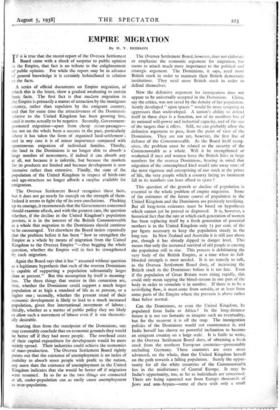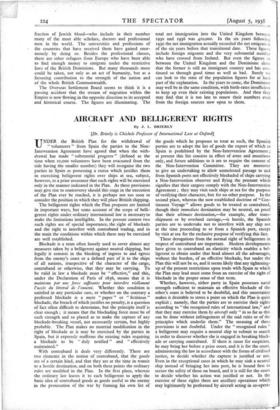EMPIRE MIGRATION
By H. V. HODSON I F it is true that the recent report of the Oversea Settlement Board came with a shock of surprise to public opinion in the Empire, that fact is no tribute to the enlightenment of public opinion. For while the report may be in advance of general knowledge it is certainly behindhand in relation to the facts.
A series of official documents on Empire migration, of which this is the latest, show a gradual awakening to certain basic . facts. The first fact is that modern migration in the Empire is primarily a matter of attraction by the immigrant country, rather than repulsion by the emigrant country, and that for some time the attractiveness of the Dominions relative to the United Kingdom has been growing less, until it seems actually to be negative. Secondly, Government- promoted migration—apart from cheap ocean-passages- has not on the whole been a success in the past, particularly where it has taken the form of organised land-settlement ; and in any case it is of minor importance compared with spontaneous migration of individual families. Thirdly, the land in the Dominions is no longer able to absorb • a large number of newcomers, if indeed it can absorb any at all, not because it is infertile, but because the markets for its products are limited and because development is now intensive rather than extensive. Finally, the state of the population of the United Kingdom in respect of birth-rate and age-structure no longer affords a surplus available for emigration.
The Oversea Settlement Board recognises these facts, but it does not go nearly far enough on the strength of them. Indeed it seems to fight shy of its own conclusions. Plucking up its courage, it recommends that the Governments concerned should examine afresh, and with the greatest care, the question whether, if the decline in the United Kingdom's population persists, it is in the interest of the British Commonwealth as a whole that migration to the Dominions should continue to be encouraged. Yet elsewhere the Board insists repeatedly that the problem before it has been " how to strengthen the Empire as a whole by means of migration from the United Kingdom to the Oversea Empire "—thus begging the whole question, whether the Empire will in fact be strengthened by such migration.
Again the Board says that it has " assumed without question as a legitimate hypothesis that each of the oversea Dominions is capable of supporting a population substantially larger than at present." But this assumption by itself is meaning- less. The three, things that matter in this connexion are, first, whether the Dominions could support a much larger population at as high a standard of life as at present, or a higher one ; secondly, whether the present trend of their economic development is likely to lead to a much increased population, given free international movement of labour ; thirdly, whether as a matter of public policy they are likely to allow such a movement of labour even if it was theoretic- ally desirable.
Starting thus from the standpoint of the Dominions, one may reasonably conclude that on economic grounds they would be better off if they had more people. The overhead costs of their capital expenditure for development would be more widely spread. Their industries could achieve the economies of mass-production. The Oversea Settlement Board rightly points out that the existence of unemployment is no index of inability to absorb more people with profit to the nation, any more than the existence of unemployment in the United Kingdom indicates that she would be better off if migration were resumed. In so far as the two things are connected at all, under-population can as easily cause unemployment as over-population. The Oversea Settlement Board, however, does not elaborate or emphasise the economic argument for migration, but seems to attach much more importance to the political and strategic argument. The Dominions, it says, need more British stock in order to maintain their British democratic institutions. They need more British stock in order to defend themselves.
Now the defensive argument for immigration does not appear to be universally accepted in the Dominions. China, say the critics, was not saved by the density of her population. Surely developed " open spaces " would be more tempting to aggressors than undeveloped. A nation's ability- to defend itself in these days is a function, not of its numbers but of its national will-power and industrial capacity, and of the size of the targets that it offers. Still, we can probably allow the defensive argument to pass; from the point of view of the Dominions. They are not yet, however, the first line of defence of the Commonwealth. As the Board itself recog- nises, the problem must be related to the security of the Commonwealth as a whole. Will it be strengthened or weakened if men and women leave the British Isles in large numbers for the oversea Dominions, bearing in mind that migration of the contemplated kind would take away soinf: of the most vigorous and enterprising of our stock at the prime of life, the very people which a country facing an imminent fall in its numbers can least afford to spare ?
This question of the growth or decline of population is essential to the whole problem of empire migration. Some of the estimates of the future course of population in the United Kingdom and the Dominions are positively terrifying. But all long-term -estimates must be based on hypotheses which cannot yet be proved or disproved. It is, however, a historical fact that the rate at which each generation of women has been replacing itself by a fresh generation of potential mothers is in the United Kingdom only 75 per cent. of the par figure necessary to keep the population steady in the long run. In New Zealand and Australia it is still just above par, though it has already dipped to danger level. This means that only the increased survival of old people is causing the population still to rise. This process is debilitating the very body of the British Empire, at a time when its full- blooded strength is most needed. It is no remedy to talk, as the Oversea Settlement Board does, of increasing the British stock in the Dominions before it is too late. Even if the population of Great Britain were rising rapidly, this could only mean tapping the blood-stream in one part of the body in order to stimulate it in another. If there is to be a revivifying flow, it must come from outside, or at least from some parts of the Empire where the pressure is above rather than below normal.
Can the Dominions, or even the United Kingdom, be populated from India or Africa ? In the long-distance future it is not too fantastic to imagine such an eventuality, but for the moment it is off the map. The immigration policies of the Dominions would not countenance it, and India herself has shown no powerful inclination to become an emigrant country on a large scale. It is futile to write, as the Oversea Settlement Board does, of obtaining a fresh stock from the northern European countriespresumably excluding Germany. These countries are even more advanced, on the whole, than the. United Kingdom herself on the path towards a falling population. Surely the oppor- tunity for all the white countries of the Commonwealth lies in the misfortunes of Central Europe. It may be India's opportunity, too, as far as individuals are concerned. There are being squeezed out from Europe thousands of Jews and non-Aryans—some of them with only a small fraction of Jewish blood—who include in their number many of the most able scholars, doctors and professional men in the world. The universities and professions of • the countries that have received them have gained enor- mously by doing so. Besides the professional classes, there are other refugees from Europe who have been able to find enough money to emigrate under the restrictive laws of the British Dominions. But many thousands more could be taken, not only as an act of humanity, but as a farseeing contribution to the strength of the nation and of the whole British Commonwealth.
The Overseas Settlement Board seems to think it is a passing accident that the stream of migration within the Empire is now flowing in the opposite direction to its accepted and historical course. The figures are illuminating. The total net immigration into the United Kingdom between 1930 and 1936 was 410,000. In the six years following 193o the net immigration actually exceeded the net emigration of the six years before that transitional date. These figures include foreign migrants and the very substantial number who have crossed from Ireland. But even the figures as between the United Kingdom and the Dominions show that the former is still an immigrant country and has con- tinued so through good times as well as bad. Surely we can look to the state of the population figures for at least part of the explanation. In the years to come, the Dominions may well be in the same condition, with birth-rates insufficient to keep up even their existing populations. And then they may find that it is too late to renew their numbers even from the foreign sources now open to them.



































 Previous page
Previous page